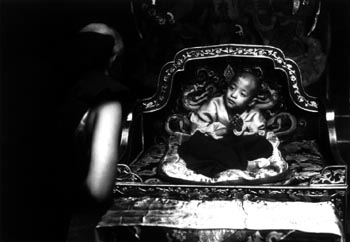Hello, Dalai
Boy Wonder: Tulku Jamyang Kunga Tensin plays the young Dalai Lama in 'Kundun.'
'Kundun' is more lesson than movie
As directed by Martin Scorsese, Kundun has all of the obvious problems of any movie made about a man one addresses as "His Holiness." Not since Pu Yi, subject of Bernardo Bertolucci's The Last Emperor, has there been such a recessive hero on screen. To a high-church Buddhist--and there are few higher or churchlier than the Dalai Lama--the ordinary actions of human kind are all just futility.
His faith is outlined here in one customarily Scorsesean image. The Dalai (Tenzin Thuthob Tsarong) stands on a hillock surrounded by hundreds of massacred, bloody monks. Is there any other way to read the image than as a statement that we're all just dead meat that the Dalai Lama feels sorry for?
Kundun records the life of the Dalai Lama up to his entry into the West, after his country, Tibet, was gobbled up by the People's Republic of China. The director's skepticism here and there makes the long mass endurable.
In one telling shot, Scorsese trains the camera on a foreshadowing rat, come to nibble on the wax of the ever-burning candles in the shrine. And, wisely, he questions some of the legends of the lamas; note, particularly, the low-key handling of a scene in which a toddler's whim equals proof of reincarnation. The director also tunes in some half-heard dialogue about the problems of providing monetary compensation to the relatives of the Lama.
Few viewers can relate to the experience of being chosen as Buddha's representative, but many can relate to being made a fool of by a smooth, paternal con artist. This may be why the best moments in Kundun are the scenes of actor Robert Lin as Chairman Mao pulling the wool over the Dalai Lama's (admittedly weak) eyes. The two sit side by side; the Lama is essentially a guest on Mao's talk show. Mao's shiny go-go boots and purring voice make for a memorable caricature: part Bismark, part Dick Cavett.
Melissa Mathison's script is well-written enough to avoid any howlers, but Kundun is a dry, passive movie, and you wonder if the current film-industry reverence toward this particular religion is just lingering sentiment for Lost Horizon.
Maybe it's just that Tibetan Buddhism is revered because it belongs to a safely remote country. (Imagine a big Hollywood movie about a revered Muslim imam.) Nor do you have any idea of what Tibetan Buddhism is about after seeing the film. The nondenominational streak customarily shown when a mainstream movie talks about God keeps Kundun from perhaps the most interesting part of Tibetan Buddhism: its mythology about death.
Hollywood's fascination with Buddhism in understandable, maybe laudable. Still, one hopes the people in the film industry remember D.T. Suzuki's caution that physical comfort shouldn't be confused with enlightenment--and remember also Jamie Lee Curtis' comment in A Fish Called Wanda that the central message of Buddhism isn't "Every man for himself."
[ San Jose | Metroactive Central | Archives ]
Copyright © Metro Publishing Inc. Maintained by Boulevards New Media.
![]()

Mario Tursi
Kundun (PG-13; 135 min.), directed by Martin Scorsese, written by Melissa Mathison, photographed by Roger Deakins and starring Tenzin Thuthob Tsarong and Robert Lin.
Web extra to the January 15-21, 1998 issue of Metro.
![[Metroactive Movies]](/movies/gifs/movies468.gif)